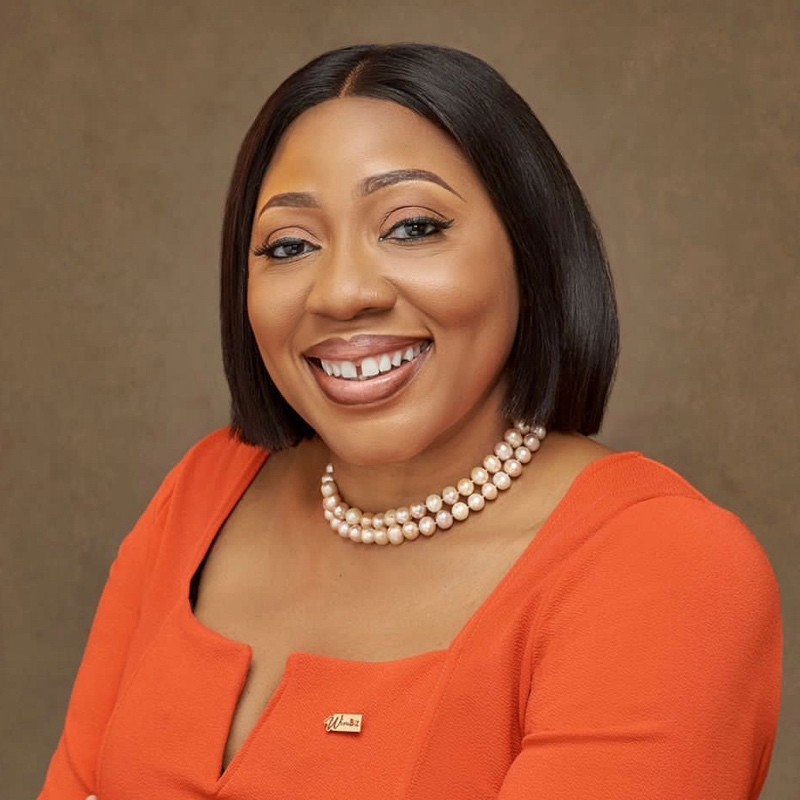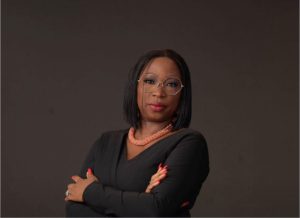“Boards aren’t looking for beauty queens; they want people who can add real value.”
Binta is a seasoned Chief Executive Officer with a proven track record in the financial services sector and management consulting.
As an accredited management trainer and one of the 50 Most Inspiring Women in Nigeria 2023, Binta embodies excellence and empowerment.
Currently, she sits on the boards of organizations like e-Tranzact Nigeria PLC, Nestle CPFA, and Sahel Consulting Limited.
She is also a dedicated advocate for women in leadership as an Executive Council member of WIMBIZ.
Is humility part of your leadership ethos? What is the mindset behind it?
Yes, humility has been a key part of my leadership ethos. Very early on, I understood the difference between being a leader and being a boss. While it’s okay to embrace the “boss lady” persona and get things done, I quickly realized the importance of carrying people along. Leadership isn’t just about forging ahead; it’s about ensuring that people are behind you, sharing the vision and taking ownership of it. Without their buy-in, a leader is simply walking alone.
I’ve always believed in creating a team spirit and fostering collaboration. This stems from my understanding that people are the real driving force behind achieving organizational objectives.
Like Jacinda Ardern, the former Prime Minister of New Zealand, once said, “You can be strong, but you can also be kind.” This philosophy has guided me since day one. I believe that being kind and considerate to the people you work with yields better results.
Moreover, I’ve learned that talent and expertise alone aren’t enough. You need people who can point out your blind spots and contribute their perspectives. As the Zulu proverb says, “To go fast, go alone; to go far, go together.” By carrying others along and valuing their input, you accomplish much more than you could on your own.
It’s also essential to genuinely care for people. As Maya Angelou put it, “People don’t care how much you know until they know how much you care.” Leadership is about showing care, respect, and love for those around you.
Whatever you put out into the world—kindness, humility, or generosity—will come back to you in abundance. This principle, deeply rooted in my faith, resonates with the scripture Galatians 6:7, which says, “Whatsoever a man soweth, that shall he reap.” I’ve always strived to sow love, care, and respect into the lives of those I work with, knowing that these values will return to me tenfold.
What are some of the key moments or decisions that have been crucial in propelling your career forward?
One of the pivotal moments in my career came when I realized that my “cheese had moved,” a concept from Spencer Johnson’s book Who Moved My Cheese?. This realization struck me during a challenging time in my financial services career. I was dealing with a difficult line manager whose behavior had become unbearable. Instead of succumbing to frustration, I decided to take control of the situation.
I requested a meeting with the managing director of the group I worked for. When the meeting was granted, I came prepared with a neatly organized folder that contained evidence of my achievements.
This included my appraisal reports, commendations from clients, and records of awards I had received, such as my team being voted the best in the bank during a survey. I had kept all these documents in what I call my “Save Your Back” (SYB) file, a repository of accomplishments that I could reference at any time.
During the meeting, I explained to the MD that I had been a valuable contributor to the organization and expressed my desire for a new role. I made it clear that while I loved the organization, I was ready to move out if there were no opportunities to move up. The MD was impressed with my preparation and acknowledged my contributions. Ultimately, this act of courage and preparation opened new doors for me within the organization.
This experience taught me the importance of taking initiative and being prepared. It’s not just about having the courage to ask for what you want, but also about doing the necessary groundwork to justify your request. Leadership and career advancement require a combination of boldness and preparation, and I’ve carried this lesson with me throughout my journey.
What was one thing you did that was pivotal in your journey?
One of the most pivotal actions I took in my journey was learning to move when necessary. I realized that I wasn’t a tree—I wasn’t rooted to one spot. If I climbed a ladder and discovered it was leaning against the wrong wall, I wasn’t afraid to come down, reposition it, and pivot to a new path. This mindset was transformative for me and led me to my first CEO role.
Another major turning point was when I decided to leave the banking and financial services sector to start my own business. This wasn’t an easy decision, especially considering the financial security and structure I was leaving behind.
Starting BMG7 came with its own challenges, but it was one of the most rewarding moves I made. Through that process, I learned the power of self-advocacy—how to bet on myself, trust my instincts, and take bold steps even when the road wasn’t clear. It’s these pivotal moments that have shaped my career and my confidence in my abilities.
How did you get your first board role?
My first board role was with Access Pension Fund Custodian, and it came about because someone within my network recommended me for the position. That person reached out to the Managing Director of the subsidiary, who, in turn, presented my name to Dr. Herbert Wigwe, the Group MD of Access Bank.
What followed was a video call where we aligned on values, expectations, and mutual goals. The process moved quickly, including obtaining regulatory approval, and I was appointed to the board.
This opportunity didn’t just happen out of the blue. It was the result of years of building and maintaining strong social capital. I made an intentional effort to stay in touch with people, show up when it mattered, and be dependable and trustworthy in my relationships. When the opportunity arose, the person who recommended me had confidence in my capabilities, and that trust opened the door for me.
Once I joined the board, I didn’t take the opportunity for granted—I gave it my all. My performance and dedication in that role became a launchpad for other board opportunities within the Access Group.
What lessons can women take from this about succeeding on a board?
Women can succeed on boards by adopting a few key principles. First, always give 110% to any opportunity you are given. Bring your absolute A-game to the table. Your performance and the value you deliver should be so strong that it speaks for itself. Success isn’t about just being present—it’s about being impactful, contributing strategically, and making your voice count.
Second, prioritize building and maintaining strong social capital. Relationships are invaluable in opening doors. Be intentional about staying connected, offering help when you can, and showing up for others. The people in your network can be the ones to recommend you for future opportunities, so be reliable and build trust.
Finally, when you do secure a board seat, recognize that this is only the beginning. Work to deliver results that make you indispensable.
Let your contributions be so significant that they pave the way for additional opportunities. When you’re in the room, don’t just blend in—make a difference and be remembered for it.
What mindset shifts have you made to transition from executive roles to board roles?
Transitioning from an executive role to a board role requires a fundamental shift in mindset. As an executive, you are deeply involved in the day-to-day operations, decision-making, and execution. On the other hand, as a board member, your role is much more about providing strategic oversight rather than dictating actions or being hands-on.
For me, this shift wasn’t abrupt; it was more like a natural progression. I had to learn to step back and focus on guiding and advising the executives rather than being the one driving decisions.
A board member’s role is to supervise and ensure that the organization is meeting its fiduciary and governance responsibilities. You’re there to ask the right questions, challenge assumptions, and provide insights based on your experience—but you must also trust the executives to handle the implementation.
This transition required me to practice restraint. For example, as someone who is naturally proactive, I had to remind myself that my job as a board member is to oversee, not to micromanage. It’s about balancing trust and accountability—providing the guidance the team needs while respecting their autonomy to make decisions. This shift in mindset has been instrumental in helping me excel in my board roles.
What do women need to do to stand out for board opportunities?
To stand out for board opportunities, women need to prioritize becoming subject matter experts in their field. Boards are always looking for individuals who can add tangible value and bring a unique perspective to the table.
It’s not about being the most visible or the most polished—it’s about being the most knowledgeable and reliable person in your area of expertise.
Developing this expertise requires continuous learning, staying updated on industry trends, and building a reputation for excellence in your work. When people think about your field, your name should be the one that comes to mind because of the depth of your knowledge and the results you’ve delivered over time.
Beyond expertise, building a strong personal brand is also crucial. Make sure your accomplishments are visible, whether through speaking engagements, articles, or networking events. It’s not enough to do the work—you must ensure the right people know about it.
Building relationships with decision-makers, mentors, and peers in your industry can also open doors to board opportunities.
Lastly, when you do get a chance to join a board, focus on delivering exceptional value. The way you show up, the insights you share, and the impact you make will determine whether you’re invited to other boards in the future.
Be intentional about every opportunity and make sure your presence is felt in a meaningful way.
Conclusion
Inspired by Binta’s journey? Subscribe to our Ascent newsletter for exclusive insights, strategies, and growth tips tailored for women aspiring to C-suite and boardroom success.
Don’t miss out on the tools to elevate your leadership journey, sign up by clicking on the link below.













